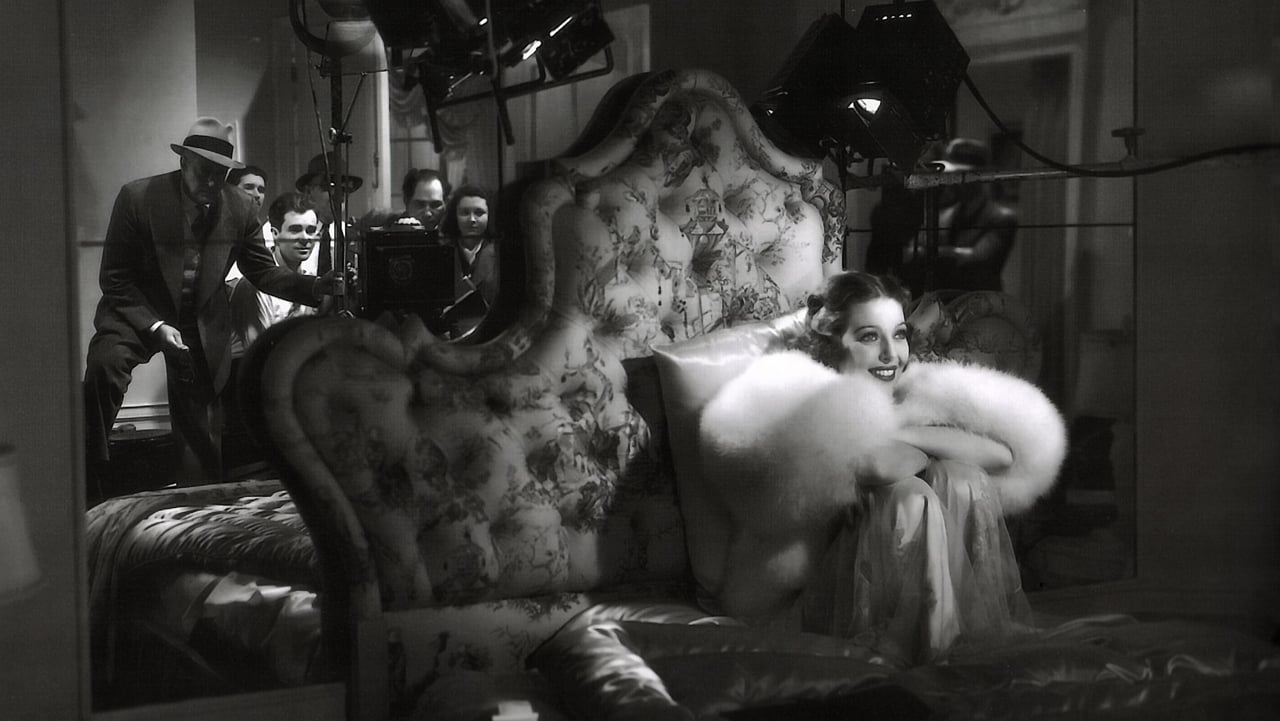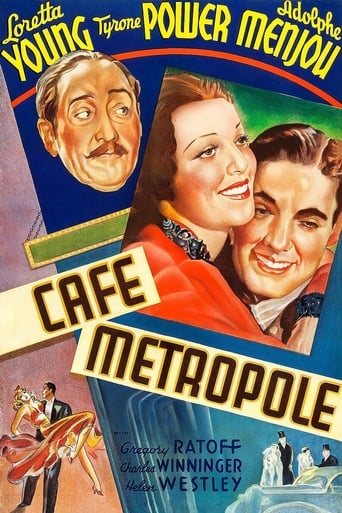weezeralfalfa
The plot of this light romantic comedy is quite absurd. Yet, if you are willing to suspend disbelief at times, it can be rather fun, especially with pretty boy Tyrone Power and gorgeous Loretta Young as the developing lovers. Victor(Adolphe Menjou), the manager of the Parisian Café Metropole, has a big problem, despite Adolphe being perfect for this role. His friend Maxi had loaned him 900,000 francs, but Adolphe hasn't a franc left, and Maxi is demanding full repayment soon. Adolphe hatches a crafty plan. He will convert the handsome American playboy, Alexander Brown, into an imposter rich Russian nobleman: Alexis Paneiev. The combination of his looks and personality, along with pseudowealth and title will hopefully be too much for single future heiress Loretta(Laura Ridgeway) to resist(Yet another single heiress, so popular in 1930s films). She immediately falls for Ty and he for her. But she doesn't fall for his imposter act. When they first met, he had no foreign accent to his American English. But, later he did, when he met her father(Charles Winninger)and mother (Helen Westley). Loretta comments on this inconsistency, and Ty admits that his accent waxes and wanes, like love. Although she pretends otherwise, from this moment, she assumes he is an American trying to impress her as a European nobleman. She doesn't disclose her suspicion until near the end of the film. Nonetheless, her father relates his experience with noblemen. "If they're charming, they're fake. If genuine, they're stupid". In either case, they're probably wrong for Loretta.Adolphe has a hold over Ty, who gave him a worthless check to pay his gambling debt. Adolphe threatens to go to the police if Ty doesn't cooperate in his scheme to weasel 1 million francs from Loretta's father. Complications arise when the real Alexis Paneiev surfaces as one of Adolphe's waiters, using a pseudonym. Adolphe offers him 50,000 francs to keep quite about the situation. Also, artist Kinskey relates that all Russians he has known smell bad, but not Ty.Loretta wants Ty to ask her to marry him. But, he says he loves her too much to marry her, presumably because then his sham would be exposed. Later, she calls him up and asks him to marry her. At first reluctant, eventually he agrees....Now, Adolphe's lawyer, Monnet, draws up a contract, in which Loretta's father pays 500,000 francs before the wedding and another 500,000 francs after the wedding, plus so much for each subsequent child(Why should he do this?). Ty walks out in disgust. But, soon after, Adolphe maneuvers Loretta's father into handing him a check for 1,000,000.francs(I don't understand why he should agree?). Father then demands that Ty be put in jail for fraud, so that he can't marry Loretta. Father then demands that Loretta leave with her parents for the US. She refuses and has a tantrum, screaming and throwing things, then crying. Rather reminds me of Carol Lombard, in "My Man Godfrey"Under father's insistence, the real Alexis is mistakenly jailed instead of Ty(How could this happen? He has a genuine passport.) But Ty isn't off the hook yet. He is also charged with being an imposter, but wiggles out of it. Strangely, Loretta's father is then charged as an imposter, despite his passport(Is this Loretta's trick?).Back at the café, Ty and Loretta enter the Café to fanfare, followed by her parents. They sit at a table with the real Alexis, who is now out of jail, and friendly with them. It's suggested that Adolphe owes Ty something for his act. Adolphe goes and gets the worthless check Ty handed him for his gambling debt. Ty happily tears it up.Loretta and Ty part from the others to talk, dance and romance. Loretta says, with a sexy French accent, "I was thinking maybe you give me beeg kiss now". Then, "My accent, it comes and goes, comes and goes", parroting Ty's statement in the flower shop.I've noted some incongruous or mysterious things in my summary. Maybe you have better insight. See it at You Tube, where there's a good print.
mll1-2
It must be 35 years or so since I saw this film in an "Art House" Theatre. But it still has left one, strong, lingering impression.There is one scene on the dance floor that took my breath away. Power is wearing a tailcoat and white tie. Young is in a satin floor length gown that clung to even inch of her elegant form. They were dancing like a young god and goddess.I remember thinking, "At that moment in time, they had to be the two most beautiful people on the face of the earth." I recall nothing else about the film save this moment. But it's quite sufficient.Sometimes, all it takes is just one scene to leave an impression that makes the memory of a film vivid for decades. In an era when class and style are neither appreciated, celebrated or understood, a film like this is a reminder of these words mean -- or at least meant.
MartinHafer
This is a harmless though brainless film. However, due to the many logical errors in the film, I can't recommend it as anything other than a time-passer--and only if you can manage to turn off your brain for a while while you watch. Otherwise, what happens in the last portion of the film might make you either throw something at the TV or curse yourself for investing this much time in a dopey film. Now I know that there are many Loretta Young and probably more Tyrone Power fans out there and I don't mean to offend them. Heck, I usually love these actors, too, but I also can't lie and say it's one of their better films.The film starts off well enough and I really liked the first half. Adolph Menjou is the co-owner of this restaurant but he needs to pay off a "loan" FAST or lost his restaurant. So, on a lark, he gambles and actually earns enough to pay off the money he lent himself (illegally) and save his butt. However, it turns out that the young guy (Tyrone Power) who he won the money from is broke. Instead of sending Power to jail for writing a bad check to cover his losses, Menjou decides to force Power into becoming his slave. And, as his slave, he has Power pose as a Russian prince so they can both bilk a rich young lady (Young) of the money to save the restaurant. So far so good.Now the fact that Power didn't do so well with impersonating a Russian wasn't a problem--after all, he wasn't supposed to be perfect and she was supposed to eventually figure out that he was a phony. However, and here's where the film gets dumb, although she knows he's a criminal, she falls in love with him(????) and insists she must marry him. Now we could assume that either Miss Young's character is schizophrenic or suffered a massive brain injury, but when her aunt agrees with her and they work hard to get Power (even after he's robbed them), this strains common sense way beyond the breaking point. She barely knew the guy and most of what she knew about him was terrible---yet she insisted on marrying him and having everyone live happily ever after. And on top of this, Ms. Young yells and bellows and over-emotes like mad when she argues with her father about this. Oh, brother, give me a barf bag!! The only reason I even gave the film a score this high is that despite being brainless, the film had some nice moments and the actors seemed to try hard with material that was simply beneath them. Also, the film deserves no better than a 4 because some excellent dance scenes with Bill "Bojangles" Robinson were in the film but they were cut before it was released!! Fortunately, they are included on the new DVD version of this film. You'll find the first one simply brilliant--and probably better than anything Fred Astaire ever did. The second cut scene is less brilliant and rather politically incorrect, but it's still a shame it was eliminated.
JohnHowardReid
A very pleasant, old-fashioned comedy of manners. A delightful group of players make the most of a screenplay that is filled to the brim with chucklesome dialogue. Director Edward H. Griffith has wisely chosen to play the whole thing straight without undue emphases or heavily weighted advance signals. You have to keep right on your toes to digest such gems as Loretta Young's casual remark that Tyrone's hat makes him look like "an eccentric pall-bearer" (and watch for the shop assistant's astute manipulation of the said hat under cover of the ensuing conversation). I loved Charles Winninger's flat aside on European nobility: "If they're charming, they're fake. If they're genuine, they're dumb!" (A dictum which he later expatiates at greater length: "He was the dumbest, stupidest dope I ever had the misfortune to shake hands with!")In a roll of velvet like this, much depends on the skills of director and cast. With Café Metropole they cut the cloth perfectly, abetted by stylish, class "A" production values including Lucien Andriot's fine camera-work, glossily attractive sets and a caressingly tuneful music score.

